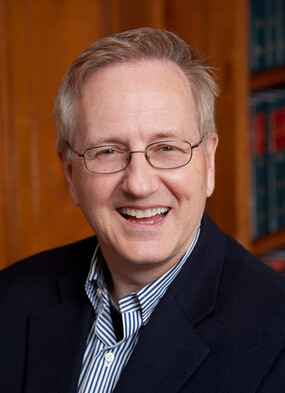William Eskridge Jr.
J.D., Yale Law School, 1978
M.A., Harvard University, 1974
B.A., Davidson College, 1973
- Constitutional Law
- Legislation
- Sexuality, Gender, and the Law
- Theories of Statutory Interpretation
- Introduction to the Regulatory State
J.D., Yale Law School, 1978
M.A., Harvard University, 1974
B.A., Davidson College, 1973
Professor William N. Eskridge, Jr. is the Alexander M. Bickel Professor of Public Law at Yale Law School. Born and raised in Princeton, West Virginia in 1951, Professor Eskridge is the son of William Nichol and Elizabeth DeJarnette Eskridge. He received his B.A., summa cum laude, from Davidson College in 1973 and his Masters in History from Harvard University in 1974. His Honors thesis at Davidson focused on the fideism of Hugenot exile Pierre Bayle (1647-1715). At Harvard, his primary Masters thesis analyzed the political thought of the Marian exiles (1553-58). Professor Eskridge earned his J.D. from Yale Law School, where he was the Note & Topics Editor of The Yale Law Journal (1977-78). After clerking for Judge Edward Weinfeld and practicing law at Shea & Gardner, he became a law professor. His primary academic homes have been the Georgetown University Law Center (1987-98) and the Yale Law School (1998-present), but Professor Eskridge has also taught at NYU, Stanford, Toronto, Pennsylvania, Harvard, Columbia, Virginia, and Vanderbilt. His primary legal academic interest has been statutory interpretation. Together, Professor Eskridge and Professor Philip Frickey (a friend from Shea & Gardner) developed an innovative casebook on Legislation. Professor Eskridge has also published Dynamic Statutory Interpretation (Harvard 1994) and several dozen law review articles (many with Frickey) on statutory interpretation theory and practice. Professors Eskridge and Frickey's project has been to understand the dynamics of statutory evolution, and the proper methodology judges should apply when construing statutes. In 1990-95, Professor Eskridge represented a gay couple suing for recognition of their same-sex marriage. Since then, he has published a field-establishing casebook on sexuality, gender, and the law (with Nan Hunter, now in its fifth edition); three monographs, and dozens of law review articles articulating a legal and political framework for proper state treatment of sexual and gender minorities. The historical materials in his book on Gaylaw: Challenging the Apartheid of the Closet (Harvard 1999) formed the basis for an amicus brief he drafted for the Cato Institute and for much of the Court’s (and the dissenting opinion’s) analysis in Lawrence v. Texas (2003), which invalidated consensual sodomy laws. Professor Eskridge’s recent books include Marriage Equality: From Outlaws to In-Laws (Yale 2020, ABA Silver Gavel) (with Christopher Riano); Interpreting Law: A Primer on How to Read Statutes and the Constitution (Foundation 2016); A Republic of Statutes: The New American Constitution (Yale 2010) (with John Ferejohn); Dishonorable Passions: The Crime Against Nature in America, 1861-2003 (Viking 2008).
Interpreting Law: A Primer on How to Read Statutes and the Constitution (Foundation 2016)
Statutes, Regulations, and Interpretation: Legislation and Administration in the Republic of Statutes (West 2014) (co-authored with Abbe R. Gluck and Victoria F. Nourse)
A Republic of Statutes: The New American Constitution (Yale University Press, 2010)
Gay Marriage: For Better or For Worse? (Oxford, 2006) (co-authored with Darren Spedale)
Equality Practice: Civil Unions and the Future of Gay Rights (Routledge, 2002)
Gaylaw: Challenging the Apartheid of the Closet (Harvard, 1999)
Constitutional Stupidities, Constitutional Tragedies (NYU, 1998) (co-authored and edited with Sanford Levinson)
Sexuality, Gender, and Law (Foundation, 1997; 2d ed. 2004; paper ed. 2005) (co-authored and edited with Nan Hunter)
The Case for Same-Sex Marriage (Free Press, 1996)
Cases and Materials on Constitutional Law: Themes for the Constitution’s Third Century (West, 1993; 2d ed. 1998; 3d ed. 2003) (co-edited with Daniel Farber and Philip Frickey)
Hart and Sacks, The Legal Process: Problems in the Making and Application of Law (Foundation, 1994) (co-authored and edited with Philip Frickey)
Dynamic Statutory Interpretation (Harvard, 1994)
Cases and Materials on Legislation: Statutes and the Creation of Public Policy (West, 1987; 2d ed. 1994; 3d ed. 2001) (co-edited with Philip Frickey and, after 2001, Elizabeth Garrett)
A Dance Along the Precipice: Political and Economic Dimensions of the International Debt Problem (Lexington, 1985) (editor and contributor)
“The First Marriage Cases, 1970-74,” in Love Unites Us: Winning the Freedom to Marry in America 21-27 (Kevin M. Cathcart & Leslie J. Gabel-Brett, eds., 2016)
“Law and the Production of Deceit,” in Austin Sarat ed., Law and Lies: Deception and Truth-Telling in the American Legal System 254-312 (2015)
“Original Meaning and Marriage Equality,” 52 Hous. L. Rev. 1067 (2015)
“Congressional Overrides of Supreme Court Statutory Interpretation Decisions, 1967-2011,” 92 Tex. L. Rev. 1317 (2014) (with Matthew R. Christiansen)
“Backlash Politics: How Constitutional Litigation Has Advanced Marriage Equality in the United States,” 93 B.U.L. Rev. 275 (2013)
“Expanding Chevron’s Domain: A Comparative Institutional Analysis of the Relative Competence of Courts and Agencies to Interpret Statutes,” 2013 Wis. L. Rev. 411
“The New Texualism and Normative Canons,” 113 Colum. L. Rev. 531 (2013) (book review)
“Marriage Equality: An Idea Whose Time Is Coming,” 37 NYU Rev. L. & Soc. Change 245 (2013)
“Nino’s Nightmare: Legal Process Theory as a Jurisprudence of Toggling Between Facts and Norms,” 57 St. Louis U.L. Rev. 865 (2012)
“Vetogates and American Public Law,” J.L. Econ. & Org. (April 2012), available online at http://jleo.oxfordjournals.org/content/early/2012/04/19/jleo.ews009.abstract
“Family Law Pluralism: A Guided-Choice Regime of Menus, Default Rules, and Override Rules,” 100 Geo. L.J. 1881 (2012)
“Noah’s Curse: How Religion Often Conflates Status, Belief, and Conduct to Resist Antidiscrimination Norms,” 45 Ga. L. Rev. 657 (2011)
“Is Political Powerlessness a Requirement for Heightened Equal Protection Scrutiny?,” 50 Washburn L.J. 1 (2010)
“Chevron as a Canon, Not a Precedent: An Empirical Study of What Motivates Justices in Agency Deference Cases,” 110 Colum. L. Rev. 1727 (2010) (with Connor N. Raso)
“The California Proposition 8 Case: What Is a Constitution For,” 98 Calif. L. Rev. 1235 (2010)
“Sexual and Gender Variation in American Public Law: From Malignant to Tolerable to Benign,” 57 UCAL L. Rev. 1333 (2010)
Senate Office of the Legislative Counsel, Legislative Drafting Manual (1997)
